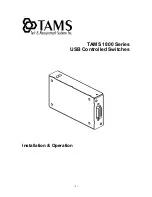
60
SI4093 System Interconnect Module User’s Guide
Any performance data contained herein was determined in a controlled
environment. Therefore, the result obtained in other operating environments may
vary significantly. Some measurements may have been made on
development-level systems and there is no guarantee that these measurements will
be the same on generally available systems. Furthermore, some measurements
may have been estimated through extrapolation. Actual results may vary. Users of
this document should verify the applicable data for their specific environment.
Trademarks
Lenovo, the Lenovo logo, Flex System, System x, NeXtScale System, and
X-Architecture are trademarks of Lenovo in the United States, other countries, or
both.
Intel and Intel Xeon are trademarks of Intel Corporation in the United States, other
countries, or both.
Internet Explorer, Microsoft, and Windows are trademarks of the Microsoft group
of companies.
Linux is a registered trademark of Linus Torvalds.
Other company, product, or service names may be trademarks or service marks of
others.
Important Notes
Processor speed indicates the internal clock speed of the microprocessor; other
factors also affect application performance.
CD or DVD drive speed is the variable read rate. Actual speeds vary and are often
less than the possible maximum.
When referring to processor storage, real and virtual storage, or channel volume,
KB stands for 1 024 bytes, MB stands for 1 048 576 bytes, and GB stands for 1 073
741 824 bytes.
When referring to hard disk drive capacity or communications volume, MB stands
for 1 000 000 bytes, and GB stands for 1 000 000 000 bytes. Total user-accessible
capacity can vary depending on operating environments.
Maximum internal hard disk drive capacities assume the replacement of any
standard hard disk drives and population of all hard-disk-drive bays with the
largest currently supported drives that are available from Lenovo.
Maximum memory might require replacement of the standard memory with an
optional memory module.
Each solid-state memory cell has an intrinsic, finite number of write cycles that the
cell can incur. Therefore, a solid-state device has a maximum number of write
cycles that it can be subjected to, expressed as total bytes written (TBW). A device
that has exceeded this limit might fail to respond to system-generated commands
or might be incapable of being written to. Lenovo is not responsible for
replacement of a device that has exceeded its maximum guaranteed number of
program/erase cycles, as documented in the Official Published Specifications for
the device.







































